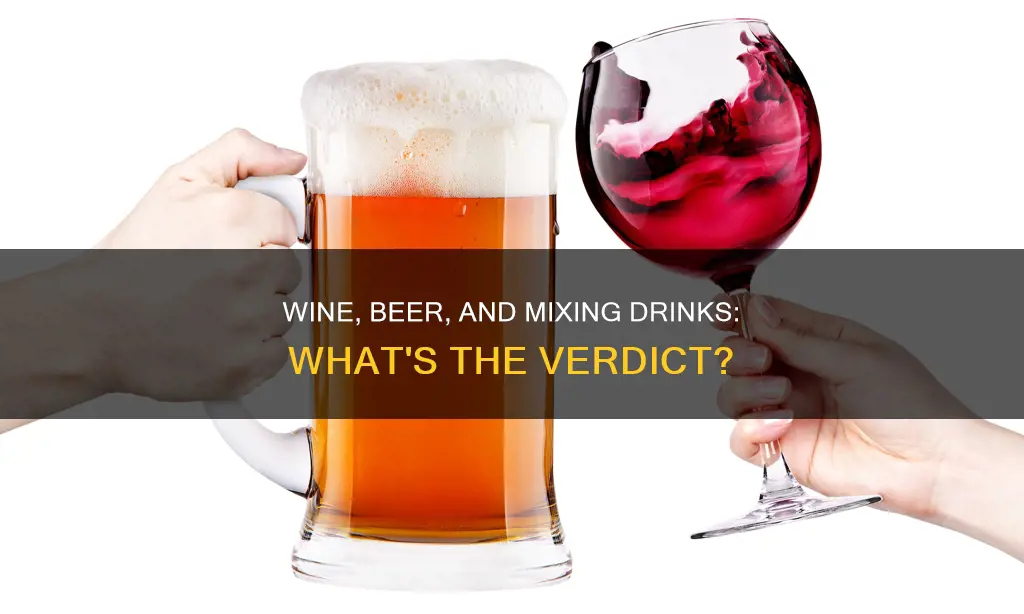
There are many theories about the order in which alcoholic drinks should be consumed to avoid a hangover. One popular saying goes: Beer before wine, you'll feel fine; wine before beer and you'll feel queer. However, scientists have debunked this myth, showing that the order of drinks does not matter and that drinking too much of any alcoholic beverage will likely result in a hangover. A 2019 study at Cambridge University found that volunteers who drank beer followed by wine reported the same intensity of hangover symptoms as those who drank wine first and then beer. The total amount of alcohol consumed and individual factors such as age, sex, body weight, and drinking habits are more influential in determining hangover severity.
| Characteristics | Values |
|---|---|
| Total amount of alcohol consumed | Has a much bigger effect on how you feel than the specific order of drinks |
| Order of drinks | A 2019 study at Cambridge University found that the order of drinks had no impact on hangover intensity |
| Hangover causes | Dehydration, immune response, disturbances of metabolism and hormones |
| Folk remedies | 'Hair of the dog' |
| Folk sayings | Grape or grain, but never the twain (English); Wein auf Bier, das rat' ich Dir -- Bier auf Wein, das lass' sein (German); Bière sur vin est venin, vin sur bière est belle manière (French) |
| Hangover predictors | How drunk you feel and whether you are sick |
What You'll Learn

Beer before wine, you'll be fine
The saying goes: "Beer before wine and you'll feel fine; wine before beer and you'll feel queer." But is there any truth to this?
Well, researchers at Witten/Herdecke University in Germany and the University of Cambridge in the UK decided to put this theory to the test. They recruited 90 participants aged 19 to 40 and split them into three groups. The first group drank two and a half pints of lager followed by four large glasses of white wine. The second group had the same drinks but in reverse order. The third group drank only beer or wine. The participants were asked to rate their level of drunkenness and, the next day, their hangover symptoms. A week later, the groups switched, so those who drank beer before wine the first time started with wine, and vice versa.
The results showed that the order of drinks did not affect the severity of hangovers. So, unfortunately, it doesn't matter whether you have beer or wine first—if you drink too much, you're likely to have a hangover.
However, the study did find that vomiting and perceived drunkenness were associated with a heavier hangover. Women also tended to have slightly worse hangovers than men. So, while the order of drinks doesn't matter, other factors can influence the intensity of a hangover.
So, the next time you're out for a drink, remember that moderation is key! Pacing yourself and drinking in moderation can help reduce the risk of a hangover, regardless of whether you start with beer or wine.
Beer and CAD: What You Need to Know
You may want to see also

Wine before beer, you'll feel queer
"Wine before beer and you'll feel queer" is a well-known saying that refers to the belief that drinking wine before beer will result in a worse hangover than drinking beer before wine. However, this notion has been debunked by scientific studies, which have found that the order of drinks does not impact the severity of a hangover.
The saying provides a catchy rhyme to help people remember the supposed rule for avoiding a hangover. The phrase suggests that by drinking wine before beer, one is inviting an unpleasant hangover experience, with "queer" implying an uncomfortable or unusual feeling. This idea has been passed down through generations and is often mentioned in social settings where alcohol is involved.
The belief that drinking wine before beer will lead to feeling "queer" has its roots in the assumption that the order of drinks matters when it comes to hangovers. It is based on the idea that starting with a drink like wine, which typically has a higher alcohol content than beer, will cause a more rapid spike in blood alcohol levels. This, in turn, is thought to contribute to a worse hangover. However, scientific research has now dispelled this myth.
In 2019, researchers from Witten/Herdecke University in Germany and the University of Cambridge in the UK conducted a study to test the validity of this saying. They recruited 90 participants aged 19 to 40 and split them into three groups. The first group drank beer followed by wine, the second group drank wine followed by beer, and the third group drank only beer or only wine. The participants were monitored throughout the experiment and asked to report on their well-being and level of drunkenness.
The results showed no significant difference in hangover intensity between the three groups. This led the researchers to conclude that the order of drinks does not influence the severity of a hangover. They found that drinking too much alcohol, regardless of the type or order, is the main factor that leads to a hangover. Therefore, the saying "wine before beer, you'll feel queer" is not supported by scientific evidence.
While the specific order of drinks may not matter, it is important to note that drinking alcohol in excess can have negative consequences. Hangovers can impact productivity, performance, and daily tasks. Additionally, factors such as dehydration, metabolism, hormone disturbances, and individual differences can influence the severity of hangover symptoms.
Beer and Coke: A Match Made in Heaven?
You may want to see also

The order of drinks doesn't matter
There is a popular saying that goes, "Beer before wine and you'll feel fine; wine before beer and you'll feel queer." However, researchers have debunked this myth, finding that the order of drinks does not matter when it comes to the severity of a hangover.
In a study conducted by researchers at Witten/Herdecke University in Germany and the University of Cambridge in the UK, 90 participants between the ages of 19 and 40 were split into three groups. The first group consumed approximately two and a half pints of beer followed by four large glasses of wine. The second group consumed the same amount of alcohol but in reverse order. The control group consumed only beer or wine. The participants were monitored throughout the session and asked to rate their level of drunkenness and hangover symptoms.
The results showed that the order of drinks did not have a significant impact on hangover intensity. Both groups who consumed beer and wine reported similar hangover scores, regardless of the order in which they were consumed. This finding was further supported by another study from Cambridge University, which found that volunteers who drank beer followed by wine reported the same level of hangover intensity as those who drank wine first and then beer.
So, if you're wondering whether to have wine before beer or vice versa, the answer is that it doesn't matter! The total amount of alcohol consumed and individual factors such as vomiting and perceived drunkenness are more reliable predictors of hangover intensity than the order of drinks. As the saying goes, "wine or beer, you'll be hung over either way!"
Drinking Beer and Riding a Bike: Is It Safe?
You may want to see also

Drinking on an empty stomach
The popular saying goes, "beer before wine and you'll feel fine; wine before beer and you'll feel queer". However, according to a 2019 study at Cambridge University, the order of drinks does not affect the intensity of a hangover. The study found that participants who drank beer followed by wine reported the same level of a hangover as those who drank wine and then beer.
Drinking large amounts of alcohol on an empty stomach can be very dangerous. The inability to think clearly or move safely can lead to serious harm or even death. Alcohol poisoning is a life-threatening condition that requires immediate medical attention. Signs of alcohol poisoning include hypothermia, loss of coordination, slow or abnormal breathing, stupor, and unconsciousness.
To reduce the risks associated with drinking on an empty stomach, it is recommended to eat at least an hour before drinking and to limit alcohol consumption to one standard drink per hour. Choosing lower-alcohol beverages, diluting drinks with water or non-alcoholic liquids, and drinking water alongside alcoholic beverages can also help mitigate the effects of alcohol.
Jason Kelce's Beer Choice: What Was He Drinking?
You may want to see also

Congeners and their effects
The saying goes, "beer before wine and you'll feel fine; wine before beer and you'll feel queer". However, studies have shown that the order in which you consume your drinks does not matter—if you drink too much, you're likely to end up with a hangover.
Hangovers are primarily caused by dehydration, the body's immune response, and disturbances in metabolism and hormones. They are influenced by ingredients other than the pure alcohol content, such as congeners. Congeners are substances other than ethanol and the desired type of alcohol that occur naturally in alcoholic beverages as a result of the distilling and
Brandy, rum, and red wine have the highest congener content, while vodka and beer have the least. This may explain why, at the same alcohol concentration, bourbon (a high-congener drink) causes a worse hangover than vodka (a low-congener drink). However, it is important to note that the effect of congeners on hangovers is not well-studied and the total amount of ethanol consumed still plays a more significant role.
In conclusion, while the order of drinks may not matter in terms of hangover intensity, drinking darker drinks or drinks with higher congener content may result in more severe hangovers due to the presence of these additional compounds.
Good Friday Beer: Is It Allowed?
You may want to see also
Frequently asked questions
No, that's just an old wives' tale. A study by the University of Cambridge and Witten/Herdecke University in Germany found that the order of drinks did not affect the severity of a hangover.
Hangovers are caused by higher-than-normal blood alcohol concentrations dropping back to zero. They are influenced by ingredients other than the pure alcohol content, such as congeners, colourings, and flavourings.
Congeners are natural compounds in alcoholic drinks that give them their distinctive flavours and colours. They are thought to contribute to hangovers.







